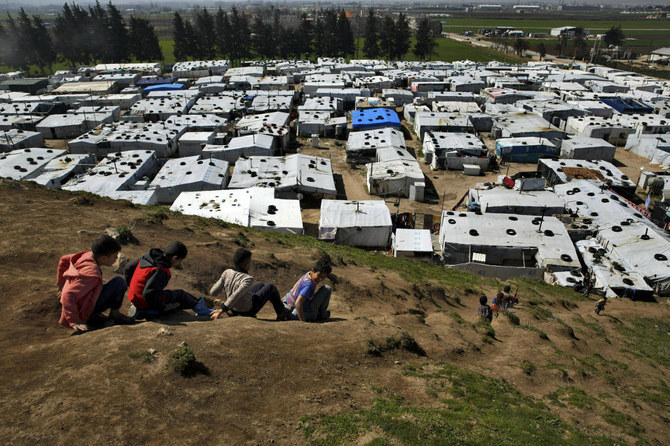
- ARAB NEWS
- 13 Jul 2025

BEIRUT: A surge in Syrian refugees entering Lebanon has ignited anti-migrant hostilities in the country, with some municipalities calling for a boycott of Syrian-operated shops and the expulsion of undocumented workers.
In regions with Christian majorities, municipalities shut down Syrian-operated shops, demanding the government enforce Lebanon’s labor laws.
Amid concern over public hostility against Syrian refugees, the Lebanese Army organized a media tour of the northern border to examine illegal crossings in Wadi Khaled.
Hundreds of Syrians cross into Lebanon through the area with the help of highly organized smuggling networks.
During the tour, the army gave a detailed presentation on the reality of border infiltration.
Pictures and videos documented how Syrians were entering the country.
The visuals showcased the professionalism of smuggling networks and the danger faced by Syrians fleeing to Lebanon.
Clips showed young Syrians hiding between piles of stones and enduring humiliation from smugglers.
Brig. Gen. Elias Aad said: “The plain landform in the region facilitates the movement of smugglers and makes it harder to catch infiltrators sneaking in through the hundreds of gaps they have created.”
The First Land Border Regiment is deployed along a 110 km section of the northern border and a section of the eastern border between Lebanon and Syria.
About 1,200 members are stationed at 31 posts on Lebanese territory.
The posts include 10 watchtowers equipped with modern cameras and night-vision sensors.
Army command says that 10 times more personnel are required to protect the border, as well as an additional 1,050 members to carry out the regiment’s duties.
According to the army’s data, the section where the regiment is deployed includes 57 towns inhabited by about 90,000 Lebanese people, as well as about 80,000 Syrian refugees and 15 refugee camps.
The watchtower on the outskirts of the town of Chadra alone has captured information on at least 100 Syrians entering the country each day.
Lebanese security and political authorities estimate that there are almost 2 million Syrian refugees in Lebanon.
The figure includes registered Syrians, legal workers, Syrian families residing legally, and refugees who illegally entered Lebanon.
The Lebanese-Syrian border has witnessed a surge of illegal migration in recent weeks.
Economic factors are the main driving force behind the mass movement of Syrians.
One source told Arab News that public anger and media propaganda against Syrian refugees has intensified over the past year.
In recent weeks, reports, statements, political programs and daily newspaper headlines in high-profile Lebanese outlets have added fuel to the fire.
The propaganda targets refugees and international organizations, such as the UNHCR.
Information Minister Ziad Makary ignited controversy on Friday by calling for Lebanese to “unite to face the threat” of Syrian refugees.
He said: “Things have reached their limit when it comes to the Syrian refugee case, and Lebanese should unite to face this threat.”
Makary’s remarks came as a car accident on Thursday night in Dawra, about 8 km east of Beirut, led to a dispute between a number of Lebanese and Syrian men, resulting in calls to expel all Syrians from the area.
A military source said that loudspeaker announcements urged locals to gather and protest against Syrian workers living in the industrial zone.
The workers had shown support for their compatriots involved in the accident.
Security forces intervened and took control of the situation after arresting eight Syrians.
Their documents were found to be illegal and were handed over to General Security.
Some protesters in Lebanon are demanding the eviction of Syrian refugees from apartments. On Friday, some Syrians closed their shops out of fear of being targeted.
The mayors of the Jdeide, Bauchrieh, and Al-Sad areas — located east of Beirut — sent a letter to the General Directorate of General Security, asking the body to “close all illegal shops operated by non-Lebanese people, taking it upon themselves to inform them.”
The three mayors also offered to provide information about Syrian-owned shops.
UNHCR spokeswoman Dalal Harb said: “The number of Syrian refugees officially registered with UNHCR in Lebanon is 795,332, while the Lebanese state, according to its response plan to the Syrian crisis, estimates their number to be 1.5 million, in addition to 2 million vulnerable Lebanese and around 200,000 Palestinian refugees, all of whom receive international aid.”
The commission highlighted its “very close work with the Lebanese government and the international community in all its programs in Lebanon, which benefit the Lebanese and refugees alike.”
The UNHCR said: “Under these programs, the commission cooperates with the Lebanese government with the aim of finding solutions for refugees, including resettling refugees in third countries.
“Since 2011, the UNHCR alone has invested more than $372.9 million in institutions and infrastructure in Lebanon to support public institutions and infrastructure by responding to multiple crises.”